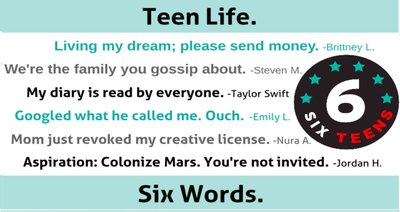

Now that you’ve looked at some examples, you’re ready to write!īut if you end up staring at a blank screen right now-I was before I was able to write a six-word story-just think of a sentence or two that might be intriguing and tells a story without telling an entire story. If you just want to look at a few quick examples, here are a few I liked: īefore you write a six-word story, you should look at some examples. Try thinking of a pivotal moment and boil it down to six words that carefully sum up your experience and convey your emotions. Find inspiration in your own life and write a little memoir.

Use punctuation marks, colons and em dashes, to join different phrases without having to use conjunctions. Shorten phrases with contractions to make room for nouns and verbs. Choose words that have purpose and meaning and drive your story forward. With only six slots to fill, you don’t have room to waste with weak word choice. Tease the audience with six words that let their mind fill in the blanks with the bigger narrative and give them a sense of a complete story. In other words, part of your story will be in what’s left unsaid. Use what’s left on the cutting room floor to draw the reader in even further. In just six little words, you can create a powerful story that evokes emotions. Entice the reader to fill in the blanks.The key to writing your own six-word story is to take an original idea, filter out most of the words, and leave the most informative ones in, to tell a whole story. Finally, a six-word story should have a feeling of resolution. It should also have a subject followed by a verb that gives it action and movement. This short story format should contain conflict-or rather, a teaser of a conflict conveyed with vivid words. These itty bitty tales are creative writing at its finest and shortest. Once you master the art of this tiny type of storytelling, try using some of your original small stories as writing prompts for your next, longer work. Six words can make a compelling narrative. While these quick stories don’t have the classic beginning, middle, and end of a traditional storyline, they have a subject and verb that give the reader a sense of what’s happened and a bit of conflict. It is a short narrative that can have all of the emotional themes of longer stories-from funny to dramatic, sad to scary. A six-word story is an entire story told in six words.


 0 kommentar(er)
0 kommentar(er)
